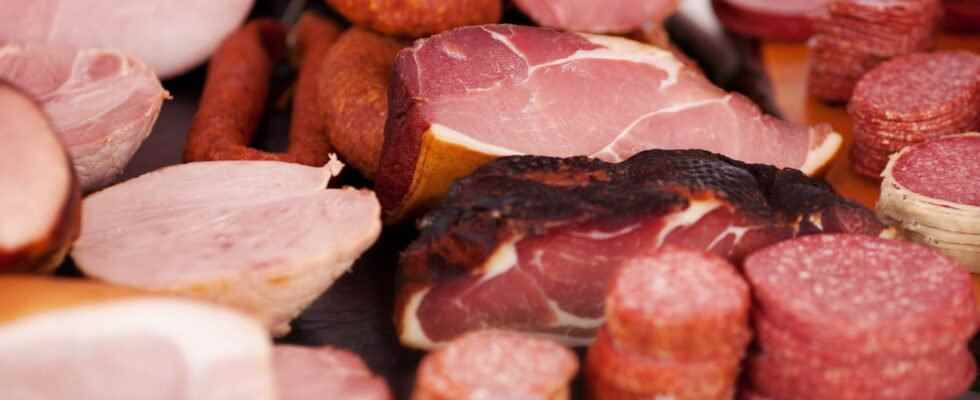Present in ham and charcuterie in general, nitrites (sodium or potassium) are additives that can promote the occurrence of cancer. A bill aimed at banning them was adopted by the Assembly. What dangers? Foods to avoid? Answers with Dr. Emmanuel Ricard of the League Against Cancer.
[Mise à jour le 4 février 2022 à 11h40] The proposal of law to ban nitrites and nitrates added to our diet (mainly charcuterie) was adopted on February 3 at the National Assembly. “This first great step forward on the subject was however far from being won in the face of significant pressure from the industrial charcuterie lobby” underlines The League against cancer in a press release of February 3. This law which has just been passed commits the Government and the elected make these decisions in the coming months, just after the long-awaited report of the National Food Safety Agency (National Food Safety Agency) (handles) next summer. In one 12 month period (not before the mid-2023), a decree will set “a trajectory of decrease in the maximum dose of nitro additives with regard to the proven risks for human health” and within 18 months after the publication of the law “a decree specifies the methods of implementation of specific labeling for products containing nitro additives”. Cancer League, Yuka and Foodwatch are mobilized to obtain theprohibition of these additives (E249, E250E251, E252) “Who present proven health risks”. “These additives can contribute to the formation of potentially carcinogenic compounds whereas manufacturers know how to do without it. From thousands of cancers would thus be preventable ; hence the importance of the law, and the urgency of this public health measure” they defend. The National Food Safety Agency must issue an opinion on the risks associated with the consumption of nitrates and nitrites by the end of the first half of 2022 (June).
What are nitrites?
behind the letters E249, E250, E251, E252 that can be read on the labels of certain food products – especially charcuterie – hide four additives :
- the potassium nitrite (E249)
- the sodium nitrite (E250)
- the sodium nitrate (E251)
- the potassium nitrate (E252)
“These additives are not part of the composition of the productthey are added because they have a conservation function, they are conservatives, explains Dr. Emmanuel Ricard, doctor delegate Prevention and Promotion of screenings at the League against cancer. They are visible to the consumer because they increase the pink character on the ham and the red character on the charcuterie.” These food additives are authorized in the European Union The maximum dose of nitrites authorized in charcuterie is 150 mg/kg in Europe. In France, the dose used is 120 mg/kg.
Why are nitrites dangerous for health?
Alone and in limited doses, nitrites are not dangerous to health. The danger arises when they are used in the manufacture of charcuterie “Chemically, the nitrites and nitrates of any kind combine with a molecule that is in the meat (heme iron, editor’s note) and which allows oxygen to be transported. A compound will form as a reaction to this combination. It is this compound that makes the food red. In the digestive tract (of the consumer, editor’s note), this compound turns into nitrosamine, a carcinogen promoter of cancer especially stomach cancer and colorectal cancer” explains Dr. Ricard.
Do nitrites promote cancer?
“We think that 4000 cancers per year are linked to the action of nitrites on charcuterie” responds our interlocutor immediately. As explained above, nitrites combine with a molecule found in meat. This combination is transformed into a carcinogenic product (nitrosamines) in the consumer’s digestive tract. “This carcinogenic product promotes cancer more particularly the stomach cancer and colorectal cancer.”
| It is recommended to limit the consumption of charcuterie to 150g per person per week and to 500g for red meat. |
|---|
Should foods containing nitrites be avoided?
“Yes, that’s what we recommend, replies Dr. Ricard, but we know that people do what they can and that many lack information on the subject and / or do not have the means. The products stamped “nitrite-free” that can be found in the delicatessen aisles actually have higher prices than those that contain it. “This is why we are asking for the elimination of nitrites which would be more egalitarian for all.”
Can nitrites be replaced in charcuterie?
Nitrites are potentially replaceable preservatives since some deli meats are displayed as “nitrite-free”. “Manufacturers and charcuterie manufacturers already have the possibility of replacing them: there is ham without nitrites on the shelves so they are able to make them“ emphasizes our interlocutor. But then why not do it for all products? “They answer that it would be very serious to remove nitrites from all products because it trigger outbreaks of botulism, listeria and salmonella because the nitrites have an effect antibacterial. Historically, that’s why we put them in manufacturing. But today there is less need for antibacterial control because the channels are much more secure. We have guaranteed control at slaughter, in all the packaging and monitoring chains and on the cold chain. There is no more botulism since there are products without nitrites.” Another possible advantage for manufacturers: market segmentation “by having on one side products with nitrites and on the other without nitrites, more “healthy” on which they ask for an additional margin“.
Thank you to Dr Emmanuel Ricard, doctor delegate Prevention and Promotion of screenings at the League against cancer.
Sources:
Nitrites: a first step forward in the National Assembly and a government that is slowing down, press release League against cancer, January 26, 2022.
Nitrites in charcuterie, update on our research, Inra, December 2021.
National nutrition and health program
